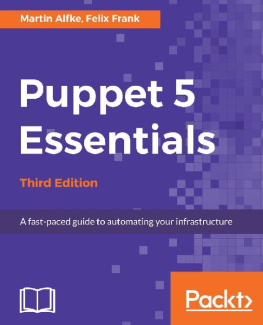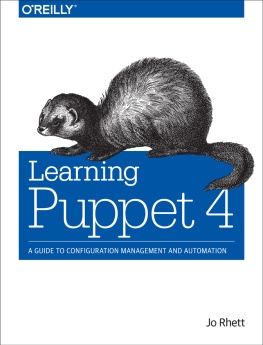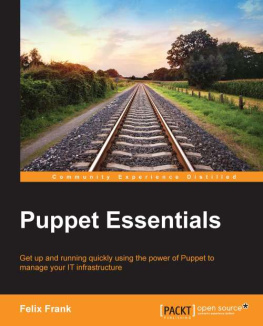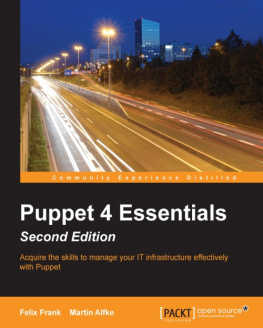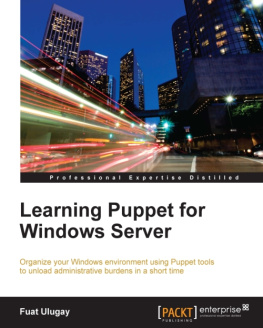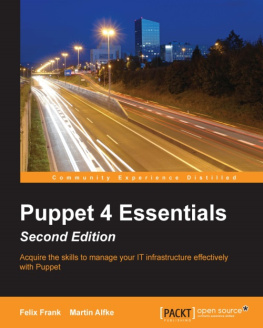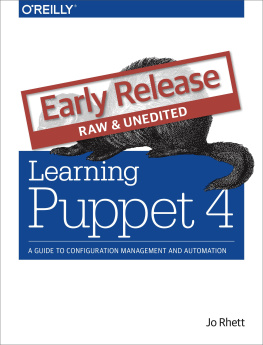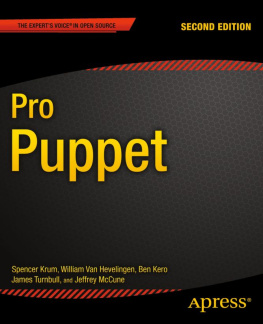Puppet 5 Essentials
Third Edition
A fast-paced guide to automating your infrastructure
Martin Alfke
Felix Frank
BIRMINGHAM - MUMBAI
Puppet 5 Essentials
Third Edition
Copyright 2017 Packt Publishing
All rights reserved. No part of this book may be reproduced, stored in a retrieval system, or transmitted in any form or by any means, without the prior written permission of the publisher, except in the case of brief quotations embedded in critical articles or reviews.
Every effort has been made in the preparation of this book to ensure the accuracy of the information presented. However, the information contained in this book is sold without warranty, either express or implied. Neither the author, nor Packt Publishing, and its dealers and distributors will be held liable for any damages caused or alleged to be caused directly or indirectly by this book.
Packt Publishing has endeavored to provide trademark information about all of the companies and products mentioned in this book by the appropriate use of capitals. However, Packt Publishing cannot guarantee the accuracy of this information.
First published: November 2014
Second edition: December 2015
Third edition: September 2017
Production reference: 1080917
Published by Packt Publishing Ltd.
Livery Place
35 Livery Street
Birmingham
B3 2PB, UK.
ISBN 978-1-78728-471-5
www.packtpub.com
Credits
Authors Martin Alfke Felix Frank | Copy Editor Safis Editing |
Reviewer Thomas Dao
| Project Coordinator Kinjal Bari |
Commissioning Editor Pratik Shah | Proofreader Safis Editing |
Acquisition Editor Chandan Kumar | Indexer Pratik Shirodkar |
Content Development Editor Mamata Walkar | Graphics Kirk D'Penha |
Technical Editor Varsha Shivhare | Production Coordinator Shantanu Zagade |
About the Authors
Martin Alfke is the co-founder and CEO of example42 GmbH. He has been a Puppet and automation enthusiast since 2007 and has delivered official Puppet training in Germany since 2011. In the past, he would have said that he is a system administrator. Nowadays, he prefers the term infrastructure engineer. The big difference is that system administrators ssh into systems, whereas infrastructure engineers fix their automation. With example42 GmbH, Martin supports Puppet Inc as a Puppet service delivery partner. He likes giving talks and workshops at conferences around the globe.
Felix Frank has used and programmed computers for most of his life. During and after working on his computer science diploma, he gained experience on the job as a systems administrator, server operator, and open source software developer. He spent six years of his eleven year career as a Puppet power user. In parallel, he spent about two years intensifying his studies through ongoing source code contributions and active participation in several conferences.
About the Reviewer
Thomas Dao has worn many hats in IT, from Unix administration, build/release engineering, DevOps engineering, Android development, and now, dad to his bundle of joy, Carina. He also enjoys being an organizer of the Eastside Android Developers GDG meetup group. He can be reached at tom@tomseattle.com.
www.PacktPub.com
For support files and downloads related to your book, please visit www.PacktPub.com .
Did you know that Packt offers eBook versions of every book published, with PDF and ePub files available? You can upgrade to the eBook version at www.PacktPub.com and as a print book customer, you are entitled to a discount on the eBook copy. Get in touch with us at service@packtpub.com for more details.
At www.PacktPub.com , you can also read a collection of free technical articles, sign up for a range of free newsletters and receive exclusive discounts and offers on Packt books and eBooks.

https://www.packtpub.com/mapt
Get the most in-demand software skills with Mapt. Mapt gives you full access to all Packt books and video courses, as well as industry-leading tools to help you plan your personal development and advance your career.
Why subscribe?
- Fully searchable across every book published by Packt
- Copy and paste, print, and bookmark content
- On demand and accessible via a web browser
Customer Feedback
Thanks for purchasing this Packt book. At Packt, quality is at the heart of our editorial process. To help us improve, please leave us an honest review on this book's Amazon page at https://www.amazon.com/dp/ 1787284719 .
If you'd like to join our team of regular reviewers, you can e-mail us at customerreviews@packtpub.com. We award our regular reviewers with free eBooks and videos in exchange for their valuable feedback. Help us be relentless in improving our products!
Table of Contents
Preface
Puppet is a configuration management tool that allows you to automate all your IT configurations, giving you control over what you do with each Puppet agent in a network, and when and how you do it. In this age of digital delivery and ubiquitous internet presence, it's becoming increasingly important to implement scalable and portable solutions, not only in terms of software but also the system that runs it.
This book aims to impart knowledge required to tap into not only the basics of Puppet, but also its core. The very basic ideas and principles of Puppet-based designs are explored and explained in this book. A sophisticated tool is presented to enable efficient and productive use.
What this book covers
, Writing Your First Manifests, explains Puppet declarative configuration management based on resources and how to implement them.
, Puppet Server and Agents, covers installation and configuration of Puppet Server, and how to comment agents to the server.
, A Peek into the Ruby Part of Puppet - Facts, Types, and Providers, explains the underlying functions of Facter and its facts, types, and providers in Puppet.
, Combining Resources in Classes and Defined Types, covers self-defined resources that allow you to simplify a repetitive code.
, Combining Classes, Configuration Files, and Extensions into Modules, explains the concepts of Puppet environments and node classification.
, The Puppet Beginners Advanced Parts, covers the Puppet features that offer readability, flexibility, and improvements such as EPP templates, virtual and exported resources, and resource defaults.
, New Features from Puppet 4 and 5, explains the concept of Puppet environments and node classification.
, Separation of Code and Data with Hiera

